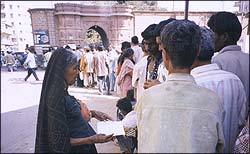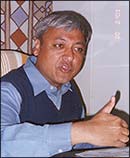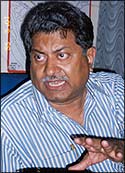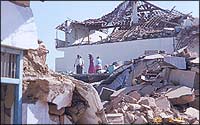| February 27, 2001 |

|
HOME | NEWS | SPECIALS | |||||||||||
|

|
The Rediff Special/Archana Masih Rebuilding from the Rubble
Part I: The Courage of Bhuj
"We have been standing here since the morning and look what they have done now? They have randomly distributed tokens till 50 and will stop after that!" Kalpanaben Vyas screams in anger. She has reason to. The earthquake forced her to move to a relative's home 100 kms from Bhuj. This is the third time she has travelled back for the government's cash assistance of Rs 2,000.
The Gujarat government had announced Rs 600 for each family member, up to a maximum of Rs 2,000 per family. The money could be collected on showing a ration card in their respective wards. Most locals agree that though they had to spend many days queuing up, they had received the promised money. The ration, including rice, wheat, flour and kerosene was also being distributed by the public distribution system. But many complain it is yet to happen, and more than rations -- it is shelter that remains a bigger problem.
The state government, consistently criticised for its tardy functioning in disbursing relief, maintains it will have the package ready in a few days. That it has already announced a few packages concerning industry and immediate relief, had announced housing package for villages and that the modalities for housing in towns was being worked upon.
Before giving an insight into the rural rehab programme, Mansingh specifies that with the government's immediate relief phase completed, the reconstruction phase is now at hand. The distribution of cash doles is almost over, household kits have been distributed and the compensation process begun. Rural reconstruction, he explains, would be a plan where the villagers will decide whether they want to relocate or continue living on their previous site. A survey by the government is already going on and the report is expected before February 28. If individuals want to relocate, they can decide on an alternate site -- which the government presumes will be near the original site. If it is private land, then the government will negotiate with the landowner. Every cluster of villages will have a centre providing them information about quake-proof housing and other building facilities. HUDCO has offered assistance. The government will also see that construction material is made available at reasonable rates. These claims may sound too good to be true, but Mansingh says, "The government can't be expected to do everything. The people should get involved. We don't want to be in a Latur-kind of situation, where the government built townships but no one lives there." District officials say the Centre has given complete support. In Mansingh's words: "The support had been unprecedented. We couldn't have asked for more. The mobilisation of the army, the movement of relief material -- we have got their full backing."
Refuting such charges of governmental apathy, Mukim says the task before the administration is to put a simple and transparent process in place with proper checks and balance. "I can't say there won't be leakage. We have to be sensitive to such leaks," says the collector. Explaining that the government had done a good job, Mukim says in any relief operation of such a large scale the benefit of doubt always lay with the people, and "never with the establishment." On the flip side, there is a view that by sending some of its best administrators -- Mukim, Mansingh and S Jagadeeshan, the relief commissioner of Bhuj -- to Kutch, the state government has been able to undo some of the earlier damage. The official machinery was able to get basics like electricity, transport and telecommunication back on the rails in quick time. "It is not as if the government has been a total failure," says the head of a well known NGO, "some of its achievements have truly been commendable and should not be ignored." Design, Photographs: Dominic Xavier The Earthquake: The Complete Coverage Tell us what you think of this special report |
HOME | NEWS | CRICKET | MONEY | SPORTS | MOVIES | CHAT | BROADBAND | TRAVEL
ASTROLOGY | NEWSLINKS | BOOK SHOP | MUSIC SHOP | GIFT SHOP | HOTEL BOOKINGS
AIR/RAIL | WEDDING | ROMANCE | WEATHER | WOMEN | E-CARDS | SEARCH
HOMEPAGES | FREE MESSENGER | FREE EMAIL | CONTESTS | FEEDBACK








